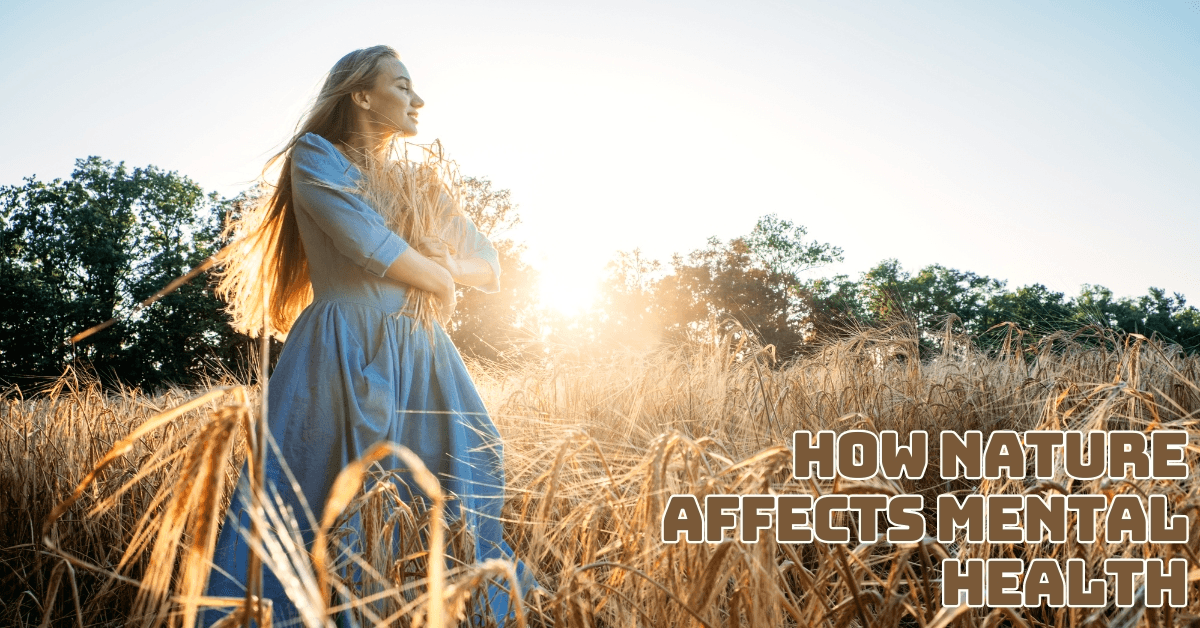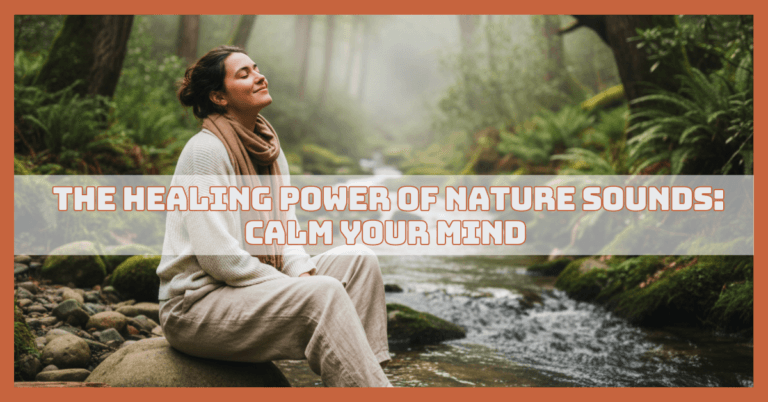How Nature Affects Mental Health
How Nature Affects Mental Health
Nature profoundly impacts mental health, providing valuable insights into how nature affects mental health by offering a sanctuary that promotes relaxation, reduces stress, and enhances overall well-being.
Studies have demonstrated that spending time outdoors, whether in verdant forests, tranquil parks, or along the sea, elevates mood, heightens emotions of contentment, and even enhances cognitive abilities.
We can find a much-needed respite from the daily grind when surrounded by nature's sights, sounds, and scents. In this article, we’ll explore how nature nurtures our mental health.

The Science Behind Nature And Mental Health
Research consistently shows a strong link between nature exposure and improved mental well-being. Several studies show that being in natural settings can help lessen the symptoms of stress, anxiety, and depression.
For instance, a study published in “Environmental Science & Technology” found that individuals who spent at least 120 minutes a week in nature reported significantly better health and well-being than those who did not.
Neuroscientific research supports these findings, revealing that natural exposure can enhance brain function and emotional regulation.
In natural environments, people's default mode network—linked to rumination and pessimism—is less active in their brains. Instead, they show increased activity in attention and emotion regulation areas.
Additionally, green spaces in urban environments have been shown to improve mood and cognitive function, contributing to lower rates of mental health disorders.
Overall, the evidence underscores that nature is not just a backdrop for relaxation but a vital component in promoting mental health, emphasizing the need for access to natural environments in our daily lives.
How Nature Affects Mental Health
There are several advantages to going outside for your physical and emotional health. The following are a few advantages of outdoor time:

1. Nature Reduces Stress And Anxiety
Nature calms the nervous system and helps reduce the stress hormone cortisol. Studies show that even a short walk in a park or time spent in a natural setting can significantly reduce feelings of stress and anxiety.
Being in nature soothes our senses, promotes relaxation, and helps break the cycle of stressful thoughts.
2. Boosts Mood And Emotional Well-Being
Time spent in green spaces provides valuable insights into how nature affects mental health. It's been linked to improved mood and increased feelings of happiness.
Exposure to nature can release neurotransmitters linked to happy emotions, such as dopamine and serotonin. This phenomenon, commonly known as “biophilia,” is the innate human need to form connections with the natural world and living organisms.

3. Nature Enhances Cognitive Function And Focus
Nature can improve cognitive function by providing a mental break from the constant stimulation of urban environments.
Studies have shown that spending time in nature enhances memory, attention span, and problem-solving skills. This phenomenon, known as “attention restoration theory,” suggests that nature helps the brain recover from mental fatigue and regain focus.
4. Promotes Physical Activity
Natural environments encourage outdoor activities such as walking, hiking, or biking, which are beneficial for mental and physical health.
Physical exercise releases endorphins improves mood, and reduces symptoms of anxiety and depression. Combining physical activity with nature exposure amplifies these positive effects.

5. Nature Supports Mindfulness And Reduces Rumination
Nature fosters a sense of mindfulness by encouraging individuals to be present and engaged with their surroundings. This can reduce rumination—repetitive, negative thinking patterns that are often linked to depression and anxiety.
Practicing natural mindfulness, such as observing plants, listening to birdsong, or feeling the breeze, can help ground and calm the mind.
6. Improves Social Connections And Community Well-Being
Nature can act as a social catalyst, encouraging group activities like picnics, hikes, or community gardening. These common experiences create a feeling of community and establish social ties, both critical for mental health.
Social interactions in natural settings are often more positive and relaxed, reducing feelings of loneliness and social isolation.

7. Nature Facilitates Emotional Healing And Recovery
Nature therapy or ecotherapy involves structured therapeutic activities in natural settings. This approach has been shown to help individuals process emotions, reduce symptoms of PTSD, and support recovery from addiction.
The peaceful and non-judgmental atmosphere of nature can make it easier to explore difficult feelings and promote healing.
8. Increases Resilience And Coping Skill
Regular exposure to nature can build resilience by providing a sense of perspective and reducing the impact of everyday stressors.
Nature reminds individuals of their place in the world, offering a sense of continuity and stability. This can help people develop healthier coping mechanisms and a stronger capacity to handle life's challenges.

9. Enhances Creativity And Problem-Solving Abilities
Immersion in natural environments has been shown to boost creativity and improve problem-solving skills. Reconnecting with nature and cutting off from technology fosters divergent thinking, which is necessary for original problem-solving. This is why many people find inspiration and clarity during walks in nature.
10. Mitigates Symptoms Of ADHD And Improves Concentration In Children
Research suggests that children with Attention Deficit Hyperactivity Disorder (ADHD) show reduced symptoms and improved concentration after spending time outdoors.
Natural settings offer a refreshing environment that helps children focus and manage impulsivity. Regular nature exposure can complement traditional treatments and improve children's overall well-being.

11. Nature Improves Sleep Quality
Exposure to natural light during the day regulates the circadian rhythm and the body's internal clock, enhancing sleep habits.
Natural settings often have lower levels of artificial light and noise, creating a peaceful environment conducive to rest. Sleep is critical for mental health because it enhances emotional stability, cognitive function, and mood regulation.
12. Decreases Symptoms Of Seasonal Affective Disorder (SAD)
Depression that only happens during certain seasons—usually winter—is known as seasonal affective disorder. Spending time outdoors offers important insights into how nature affects mental health, particularly in decreasing symptoms of Seasonal Affective Disorder (SAD) by increasing exposure to natural light.
Activities such as winter walks or outdoor exercise can help alleviate the lethargy and mood swings associated with SAD.

13. Nature Strengthens The Immune System
Spending time in nature has been shown to boost the immune system, thanks to factors like fresh air, physical activity, and phytoncides—natural chemicals released by plants that have been found to enhance immune function.
A stronger immune system can reduce the likelihood of illness, indirectly supporting better mental health by reducing stress and anxiety related to health concerns.
14. Promotes A Sense Of Purpose And Meaning
Engaging with nature through gardening, caring for plants, or participating in conservation activities can provide a sense of purpose and fulfillment.
This sense of meaning is important for mental health, as it can increase motivation, self-esteem, and overall life satisfaction.

15. Nature Facilitates Emotional Connection And Compassion
Being in nature can foster a deeper emotional connection to the environment and other living beings. This connection often increases empathy and compassion towards nature, others, and oneself. Such feelings can reduce negative emotions like anger and frustration, promoting a positive outlook on life.
16. Offers A Safe Space For Reflection And Self-Discovery
Nature provides a quiet, non-judgmental space that encourages introspection and self-discovery. Time spent alone in nature can help people reflect on their lives, process emotions, and gain new perspectives on personal challenges. This can be especially beneficial during times of stress or when facing difficult life transitions.
17. Enhances Sensory Experiences
Natural environments engage all the senses—sight, sound, smell, touch, and even taste—creating a rich sensory experience that is soothing and stimulating.
The sights of vibrant greenery, the sounds of rustling leaves or flowing water, and the smells of flowers and fresh air all contribute to a sensory immersion that can elevate mood and provide a mental escape from everyday stress.

18. Nature Facilitates Grounding And Reduces Negative Thinking
Walking barefoot on grass or sand is one way to have direct physical contact with the soil, often known as “earthing.” This practice stabilizes the body’s electrical state and promotes calmness and balance.
It may lessen pessimistic thought habits and anxiety by reconnecting individuals to the present moment and the physical world.
19. Encourages Healthy Behavioural Patterns
Spending time in nature exemplifies how nature affects mental health by encouraging healthier lifestyle choices, including improved diet, increased physical activity, and better sleep routines.
These behavioural changes can have a positive feedback loop on mental health, supporting long-term well-being and resilience.
20. Influences The Hormonal Balance
Natural environments produce endorphins, serotonin, and oxytocin—hormones linked to happiness and stress reduction—and have other beneficial effects on hormonal balance.
These hormonal changes can help improve mood, reduce pain perception, and promote feelings of love and social bonding.

21. Nature Supports Emotional Regulation And Reduces Impulsivity
Nature provides a calming environment that helps regulate emotions and reduce impulsivity. People who suffer from problems from emotional regulation problems, such as those with mood disorders or ADHD, can especially benefit from this.
The peacefulness of nature can create a space for individuals to process emotions and respond to situations more thoughtfully.
22. Aids In Recovery From Trauma And Grief
Nature can effectively aid the healing process from trauma and loss. The tranquillity and beauty of natural environments can provide solace and a sense of continuity in the face of loss.
Activities like nature walks, gardening, or simply sitting in a peaceful natural setting can offer therapeutic experiences that support healing.
23. Promotes Altruism And Environmental Stewardship
A stronger bond with the natural world can encourage environmental stewardship and accountability. Engaging in activities like tree planting, community clean-ups, or volunteering for conservation projects can enhance feelings of altruism and purpose, which contribute to a sense of belonging and fulfillment.
24. Influences On Psychological Resilience And Hardiness
Exposure to the unpredictability of natural environments provides insights into how nature affects mental health by building psychological resilience and hardiness.
These qualities help individuals cope with adversity and stress in other areas of their lives, making them more adaptable and mentally strong.

25. Nature Reduces Technology Dependence And Screen Fatigue
Spending time in nature helps break the cycle of constant technology use, which is linked to increased stress, anxiety, and sleep disturbances.
Unplugging from displays and spending time in nature can all reduce screen weariness, enhance eye health, and encourage better digital behaviours.
Practical Tips For Incorporating Nature Into Daily Life
Incorporating nature into your daily routine can be a powerful way to enhance your mental and physical well-being. Even a few minutes a day spent outdoors or engaging with nature can make a significant difference. Here are some useful hints for incorporating nature into your daily life:
1. Start Your Day With Fresh Air
Begin your day by stepping outside for a few minutes. Whether on your balcony, in your backyard, or simply by an open window, taking a moment to breathe in the fresh air and listen to the sounds of nature can set a positive tone for the day ahead.
If possible, enjoy your morning coffee or tea outside. This small habit can help you feel more grounded and provide a calming start to your day.
2. Bring Nature Indoors
If getting outside isn’t always possible, bring elements of nature indoors. Houseplants, flowers, and even small herb gardens can create a natural atmosphere in your living space.
Place your desk next to a window to take advantage of the natural light and views of the outdoors, which can lift your spirits and increase productivity.
3. Take Short Nature Breaks
Taking short breaks outdoors illustrates how nature affects mental health. Even a quick walk or moment of stillness can rejuvenate your mind and body.
For example, a quick walk around the block or a moment of stillness in a nearby park can rejuvenate your mind and body.
Practice mindful breathing during these breaks. Pay attention to the sights, sounds, and smells around you to completely immerse yourself in the experience.
4. Exercise Outdoors
Whenever possible, choose outdoor locations for your physical activities. Whether it's jogging, cycling, yoga, or simply stretching, being active provides additional benefits compared to indoor exercise.
Try new outdoor activities like hiking, paddleboarding, or bird watching. Exploring different environments can keep your routine exciting and expose you to new aspects of nature.
5. Create A Green Workspace
Add plants to your work or study space. Research shows that having greenery nearby can reduce stress and improve concentration.
Consider low-maintenance plants like snake plants or succulents if you have a busy schedule. These plants, ants, benefit from a natural presence with little upkeep.
6. Eat Outdoors
Whenever the weather permits, take your meals outside. A lovely way to spend time with nature is to go to the park, have lunch on the patio, or even have a quick snack in the garden.
If outdoor dining isn’t feasible, try to position yourself near a window with a view of greenery while eating.
7. Practice Mindfulness In Nature
Engage in mindfulness practices like forest bathing, where you immerse yourself in a natural environment, using all your senses to experience the moment fully.
Try grounding exercises like barefoot walking on grass, sand, or dirt to establish a physical and mental connection with the earth.
8. Cultivate A Garden Or Balcony Garden
If you have space, start a small garden. Even a few pots of herbs or flowers can provide a rewarding connection to nature.
For those in apartments, consider a balcony garden or window boxes. Growing your plants can be therapeutic and give you a sense of accomplishment.
FAQ
1. How Much Time Should I Spend In Nature To See Mental Health Benefits?
Answer: Research suggests that at least 120 minutes per week in nature can enhance mental well-being. This could be spread over several days, with just 20 minutes a day providing benefits.
2. Why Is Being In Nature Better For Mental Health Than Staying Indoors?
Answer: Being outdoors in natural environments offers exposure to fresh air, sunlight, and natural scenery, which helps lower cortisol levels and reduces mental fatigue. Indoor settings may lack these restorative elements.
3. Can Physical Activities In Nature, Like Hiking Or Gardening, Improve Mental Health?
Answer: Yes, physical activities like hiking, walking, or gardening combine the benefits of nature and exercise, releasing endorphins and improving mood, focus, and cognitive function.
4. How Does Sunlight Exposure In Nature Affect Mood?
Answer: Sunlight helps increase serotonin levels, a hormone linked to mood elevation, and improves sleep by regulating the body’s circadian rhythm. As a result, stress levels may drop, and mental health may improve.
5. Is Any Scientific Research Supporting Nature’s Impact On Mental Health?
Answer: Numerous studies support the link between nature and mental health. For example, the American Psychological Association (APA) research emphasizes how spending time in nature can enhance cognition, lower the risk of mental disease, and lessen negative thoughts.
6. Can Nature Help Children And Adolescents With Mental Health Issues?
Answer: Yes, spending time in nature can enhance cognitive development, reduce attention disorders like ADHD, and help children and adolescents manage stress and anxiety more effectively.
Conclusion
Ultimately, comprehending how nature influences mental health highlights its deep and diverse influence on lowering stress, anxiety, and melancholy while elevating mood and general well-being.
Frequent time spent in natural settings can improve mood, concentration, and general well-being while lowering stress, anxiety, and depression.
Whether through a leisurely walk in the park, mindful time spent gardening, or simply observing the beauty of a sunrise, nature offers a powerful antidote to the pressures of modern life.
By prioritizing time in natural settings, we can nurture our mental health and foster a deeper connection with the world, leading to a more balanced and fulfilling life.
I trust you enjoyed this article about How Nature Affects Mental Health. Please stay tuned for more blog posts soon.
JeannetteZ
>>>Please click here to read my all-inclusive article about Lessons That Will Teach You All About Stress<<<
>>>Are you interested in Natural Healing And Stress Relief through Herbs? Please click here for my #1 Recommendation<<<
Your Opinion Is Important To Me
Do you have thoughts, ideas, or questions? I would love to hear from you. Please leave me your questions, experiences, and remarks about How Nature Affects Mental Health in the comments section below. You can also email me at Jeannette@Close-To-Nature.org.
Disclosure
This post may contain affiliate links. I earn from qualifying purchases as an Amazon Associate and other affiliate programs. Please read my full affiliate disclosure.
You might also enjoy these blog posts:
9 Best Ways To Relieve Stress With Nature
8 Best Tips To Reduce Stress Naturally
9 Best Massages For Stress Relief
What Is A Stress Relief Massage?







